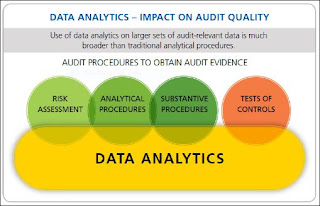In
September 2016, the International
Auditing and Assurance Standards Board (IAASB)’s Data Analytics Working Group (DAWG) released a
Working Group Paper, Exploring the
Growing Use of Technology in the Audit, with a Focus on Data Analytics. The Paper is
open for comment until February 15, 2017. In addition, this publication is a
call for nominations for a newly formed Project Advisory Panel to further
advise the IAASB and the DAWG on developments relevant to standard setting.
The
Paper provides insights into the opportunities and challenges with the use of
data analytics in the audit of financial statements and outlines the insights
gained from the activities to date. The purpose of the Request for Input is to:
- Inform stakeholders about the IAASB’s ongoing work to explore effective and appropriate use of technology, with a focus on data analytics, in the audit of financial statements; and
- Obtain stakeholder input and perspectives on whether all the considerations relevant to the use of data analytics in a financial statement audit have been identified.
The
DAWG paper (page 16) emphasizes that: “The use of data analytics in an audit of
financial statements will not replace the need for the auditor to exercise
appropriate professional judgment and professional skepticism. Strong views have
been expressed by the IAASB CAG and at IAASB roundtables about the importance
of the auditor having a thorough understanding of the entity and its
environment in order to facilitate a high-quality audit in which professional
skepticism is appropriately applied.”
For
additional insights, refer to the June 2016 Audit Data Analytics
Alert issued by CPA Canada.


